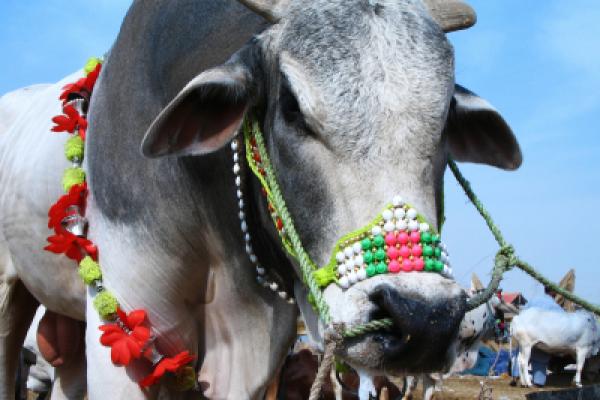
I expect the Muslims to know what Eid al-Adha is but not anyone else really, so I thought I'd write a little about this celebration to introduce it. The word "eid" means celebration or feast, so Muslims celebrate this day by dressing smartly, going to the mosque and praying the eid prayer, visiting friends and family, exchanging gifts and feasting together. Al-Adha roughly means "The sacrifice/slaughter". So all together it means the "Celebration of the Sacrifice". Muslims worldwide celebrate two eids annually, the other being Eid Al-Fitr, which marks the end of the holy month fasting, Ramadhan. Eid Al-Fitr and is the larger eid of the two.
"The Celebration of the Sacrifice", or Eid Al-Fitr, refers to the slaughtering of a ram (sheep). The backstory goes something like this: Prophet Abraham (PBUH), having lived a long life and being married to Sarah (RA) for a long while, was without any children because his wife was barren. The family wanted to have a child so Sarah asked her servant Hagar if she would like to marry Abraham and she agreed and sure enough she became pregnant. Soon enough the little baby boy was born and they called him Ismaeel (Ishmael). After a few years, Prophet Abraham started having dreams where he was commanded to take his only son to a certain place outside the city and slaughter him with a sharp knife. Now you can probably imagine how overjoyed they were, having been childless for so long, and then they were blessed with a child - now they became especially distressed that they would lose their only child. But Abraham, being a Prophet, knew it was a command from God and went to his son and told him what he planned to do. Rather than screaming, running-away or rebelling, the young Ishmael accepted this command from God and accepted his presumed fate. So the next morning, the Prophet took a sharp knife, some rope to bind the child's limbs together and awoke Ismaeel to guide him to an alter where he would soon carry out the slaughter. They walked a while before they got there and ishmael willingly presented his hands and legs to be bound, and they were, and he was positioned, ready for slaughter. Then Abraham raised the razor-sharp knife and uttered the name of God and was about to strike Ismaeel when God commanded an angel to stop him from killing his son and replace the child with a ram (sheep) to be slaughtered instead. Thus, both Ishmael and Abraham were tested by their Lord and succeeded and their spiritual stations were raised.
This story and many others related to the stories of Abraham, considered the grandfather of the Prophets, are commemorated by the Muslims during the pilgrimage rites. One of the rituals of the pilgrimage is the slaughter of an animal like a sheep, cow, camel or goat, and they cook and eat some of it and give the rest to friends, family and the poor. Eid al-Adha is also know as Eid al-Hujjaj - Eid of the Pilgrims - and Eid al-Adha marks the completion of the pilgrimage event. The day of completion is on the 10th day of the last month of the Muslim Calender, the month of Dhul-Hijjah. To read more about the pilgrimage, or hajj, please check out the About Islam section of the website - The Five pillars of Islam: Hajj (Pilgrimage). And if you would like to view some photos from Makkah and the pilgrimage and also from Madina,
